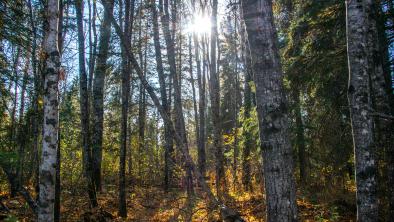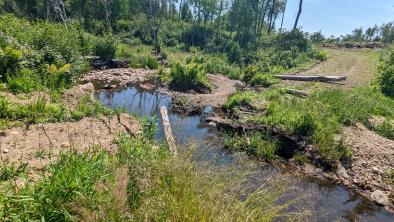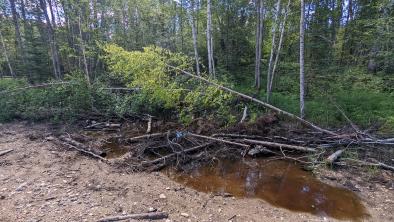Report and maps reveal extensive logging in Algonquin and Duck Mountain Provincial Parks

News Release
Wilderness Committee campaign aims to end logging in Ontario and Manitoba parks
WINNIPEG - In 2015 the Wilderness Committee launched its campaign to end park logging in Ontario and Manitoba, with the release of an educational report and maps revealing the extensive logging that is still permitted in Algonquin Provincial Park and Duck Mountain Provincial Park.
“Algonquin and Duck Mountain Parks are mere shadows of their ecological selves, with the continuation of destructive commercial logging within their boundaries,” said Eric Reder, Wilderness and Water Campaigner.
The new provincial park maps document the extent of forest disturbance that is occurring in both of these popular parks, demonstrating the damaging impact of logging on park ecosystems and wildlife habitat. In addition to sections that have already been logged, the maps show significant areas of the parks that are proposed to be logged by 2020.
“The integrity of Algonquin and Duck Mountain Parks is being destroyed for logging company profits,” said Reder. “These new maps show just how much devastation is occurring.”
This push to end logging in parks comes amidst several noteworthy anniversaries related to logging in Canada’s parks. The National Parks Act, which passed on May 30, 1930, removed industrial activity from national parks, while the Manitoba government banned logging in all provincial parks except Duck Mountain early in June 2009. Logging ended in all Ontario parks except Algonquin in 1995, and was officially prohibited by law with the passing of a new provincial parks act in 2006.
In Manitoba, the government has been secretive about extending controversial contracts to continue to log in Duck Mountain Provincial Park through 2018. In Ontario, astonishingly, the government has a crown agency – the Algonquin Forest Authority – that carries out logging within the park and lobbies to promote continued logging activity.
“Manitobans and Ontarians are being kept in the dark about the real impact of logging in parks, said Reder. “Logging eliminates and fragments wildlife habitat, contributes to water quality issues and causes long-term harm to areas that are supposed to be set aside for nature.”
In his annual report released in October 2014, Ontario Environment Commissioner Gord Miller called for an end to logging in Algonquin Park. Back in 1993, the Manitoba government’s Clean Environment Commission recommended that “commercial forestry activity in all provincial parks should be phased out.”
“Our unfettered wilderness is disappearing around us,” said Reder, “Our parks must be protected from destruction. The time is now – the public will definitely exists. We have to end park logging. To do any less is to fail for future generations.”
To download the full report, End Logging in Ontario and Manitoba Parks, visit: https://www.wildernesscommittee.org/sites/all/files/publications/2015_StopLogging_paper-web.pdf
–30–
For more information, please contact:
Eric Reder | Wilderness and Water Campaigner, Wilderness Committee - (204) 997-8584
Additional resources:
Map of logging in Algonquin Provincial Park (PDF)
https://www.wildernesscommittee.org/sites/all/files/Algonquin_logging_Map_2015.pdf
Map of logging in Duck Mountain Provincial Park (PDF)
https://www.wildernesscommittee.org/sites/all/files/Duck_Mountain_Park_logging_map_2015.pdf
Photos of logging in Duck Mountain Provincial Park available upon request.
---
Photo: Logs stacked in a clearcut in Duck Mountain Provincial Park, Manitoba (Eric Reder).


